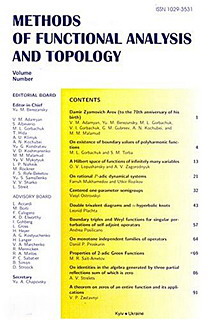Vol. 22 (2016), no. 2
Generalized solutions of Riccati equalities and inequalities
D. Z. Arov, M. A. Kaashoek, D. R. Pik
MFAT 22 (2016), no. 2, 95-116
95-116
The Riccati inequality and equality are studied for infinite dimensional linear discrete time stationary systems with respect to the scattering supply rate. The results obtained are an addition to and based on our earlier work on the Kalman-Yakubovich-Popov inequality in [6]. The main theorems are closely related to the results of Yu. M. Arlinskiĭ in [3]. The main difference is that we do not assume the original system to be a passive scattering system, and we allow the solutions of the Riccati inequality and equality to satisfy weaker conditions.
Inverse moment problem for non-Abelian Coxeter double Bruhat cells
MFAT 22 (2016), no. 2, 117-136
117-136
We solve the inverse problem for non-Abelian Coxeter double Bruhat cells in terms of the matrix Weyl functions. This result can be used to establish complete integrability of the non-Abelian version of nonlinear Coxeter-Toda lattices in $GL_n$.
On nonsymmetric rank one singular perturbations of selfadjoint operators
Mykola Dudkin, Tetiana Vdovenko
MFAT 22 (2016), no. 2, 137-151
137-151
We consider nonsymmetric rank one singular perturbations of a selfadjoint operator, i.e., an expression of the form $\tilde A=A+\alpha\left\langle\cdot,\omega_1\right\rangle\omega_2$, $\omega_1\not=\omega_2$, $\alpha\in{\mathbb C}$, in a general case $\omega_1,\omega_2\in{\mathcal H}_{-2}$. Using a constructive description of the perturbed operator $\tilde A$, we investigate some spectral and approximations properties of $\tilde A$. The wave operators corresponding to the couple $A$, $\tilde A$ and a series of examples are also presented.
Hilbert space hypocoercivity for the Langevin dynamics revisited
Martin Grothaus, Patrik Stilgenbauer
MFAT 22 (2016), no. 2, 152-168
152-168
We provide a complete elaboration of the $L^2$-Hilbert space hypocoercivity theorem for the degenerate Langevin dynamics via studying the longtime behavior of the strongly continuous contraction semigroup solving the associated Kolmogorov (backward) equation as an abstract Cauchy problem. This hypocoercivity result is proven in previous works before by Dolbeault, Mouhot and Schmeiser in the corresponding dual Fokker-Planck framework, but without including domain issues of the appearing operators. In our elaboration, we include the domain issues and additionally compute the rate of convergence in dependence of the damping coefficient. Important statements for the complete elaboration are the m-dissipativity results for the Langevin operator established by Conrad and the first named author of this article as well as the essential selfadjointness results for generalized Schrödinger operators by Wielens or Bogachev, Krylov and Röckner. We emphasize that the chosen Kolmogorov approach is natural. Indeed, techniques from the theory of (generalized) Dirichlet forms imply a stochastic representation of the Langevin semigroup as the transition kernel of diffusion process which provides a martingale solution to the Langevin equation. Hence an interesting connection between the theory of hypocoercivity and the theory of (generalized) Dirichlet forms is established besides.
On the generation of Beurling type Carleman ultradifferentiable $C_0$-semigroups by scalar type spectral operators
MFAT 22 (2016), no. 2, 169-183
169-183
A characterization of the scalar type spectral generators of Beurling type Carleman ultradifferentiable $C_0$-semigroups is established, the important case of the Gevrey ultradifferentiability is considered in detail, the implementation of the general criterion corresponding to a certain rapidly growing defining sequence is observed.
Level sets of asymptotic mean of digits function for $4$-adic representation of real number
M. V. Pratsiovytyi, S. O. Klymchuk, O. P. Makarchuk
MFAT 22 (2016), no. 2, 184-196
184-196
We study topological, metric and fractal properties of the level sets $$S_{\theta}=\{x:r(x)=\theta\}$$ of the function $r$ of asymptotic mean of digits of a number $x\in[0;1]$ in its $4$-adic representation, $$r(x)=\lim\limits_{n\to\infty}\frac{1}{n}\sum\limits^{n}_{i=1}\alpha_i(x)$$ if the asymptotic frequency $\nu_j(x)$ of at least one digit does not exist, were $$ \nu_j(x)=\lim_{n\to\infty}n^{-1}\#\{k: \alpha_k(x)=j, k\leqslant n\}, \:\: j=0,1,2,3. $$


